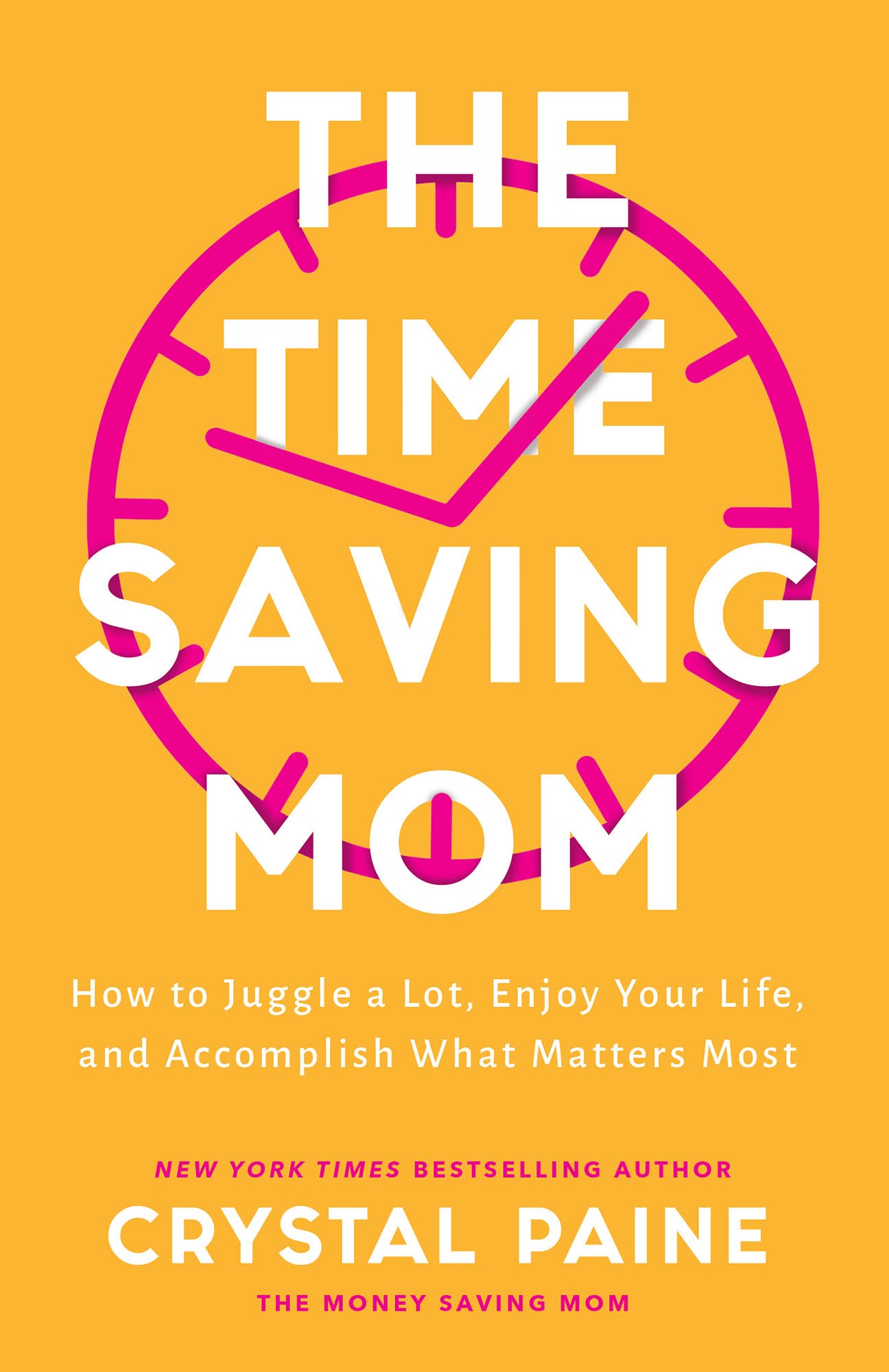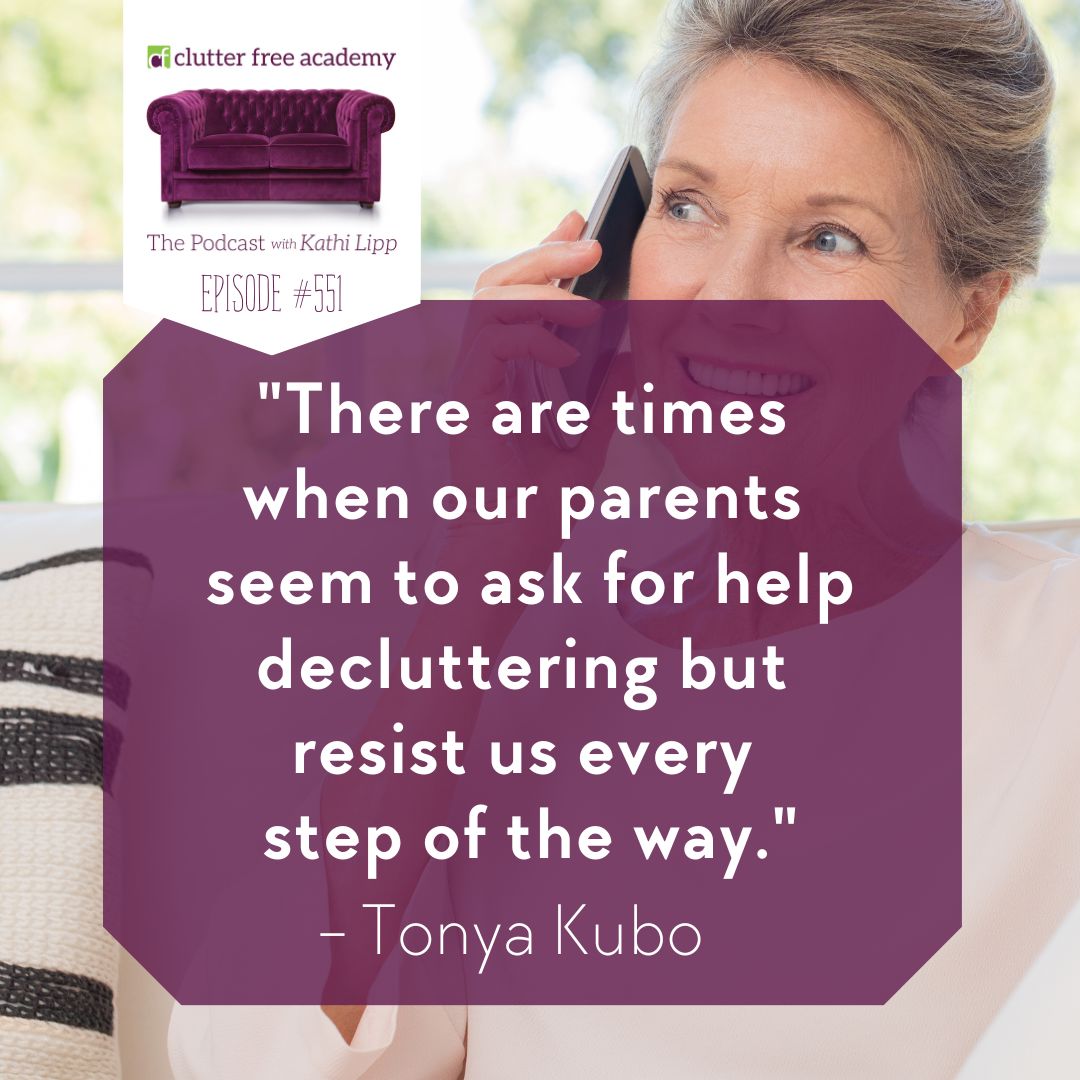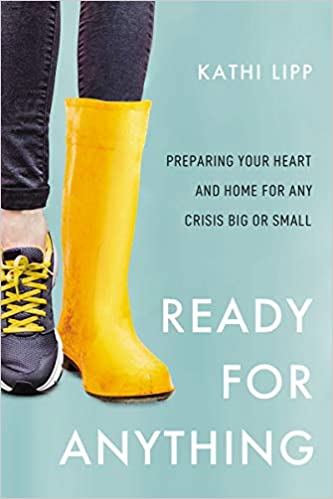Read along with the podcast!
Clutter Free Academy Podcast #384
Can Less Clutter Lead to Less Family Grumbling?
Kathi – Well, hey friends. Welcome to Clutter Free Academy, where our goal is to help you take small do-able steps to live every day with less clutter and more life. Today we are really not on the ‘less’ part of it. We’re on the ‘super-sized’ part of life. I am here with my friend Tricia Goyer. How many books, Tricia?
Tricia: Seventy five? I think seventy five.
Kathi – People always are like, “I can’t believe how many books you’ve written, Kathi.” And I’m like, “Have you met my friend Tricia?” I am still in pre-school when it comes to that. You’re unusual in that you have succeeded in fiction, non-fiction. You’ve been all over the place. You’re one of the few people who have done it and done it well. I have been especially excited about your latest book, “The Grumble Free Year”. Tricia, welcome to Clutter Free Academy.
Tricia – Thank you so much. I always love chatting with you.
Kathi – We have so much fun. I get to be a part of what you’re doing in Write That Book. Give us two sentences about what Write That Book is. I’ll put that link in there, ‘cause we have lots of people who love to write who listen to this podcast.
Tricia – I get asked all the time by people, to mentor them on how to write a book; how to get started; how to talk to agents and I love helping people, but I cannot help people individually, so I started this subscription group and I have 3-5 experts a week come in for an hour and teach on a subject. How to Write a Book Proposal, How to Prepare for a Conference. It’s $29/month and I just feel like I want to give them a ton of help. They can ask question that we will answer in there. So, it’s great.
Kathi – It is! It’s so much fun to be in there. I love seeing everybody growing and doing. Today, ‘though, I want to talk about The Grumble Free Year. As we are approaching the holidays and we’re in the thick of it, it’s the time that we always talk about being the most grateful, but also I feel like it’s also the time where it’s the easiest to become dissatisfied. This was an experiment, not just for you, it was for your entire family. Can you just give us a snapshot of your family?
Tricia – Yeah! So, I’ve been married to John for twenty nine years. Before I met and married him, I was a teen mom. So, I had my son Cory, and I met and married John and we had two more kids, so that brings it up to three. Then we adopted seven kids, and my grandma, who’s 90, lives with us, too.
Kathi – Holy cow.
Tricia – So, some of the kids are out of the house. We have three out of the house. We have seven kids, and grandma and me and my husband and two dogs and a rabbit and hermit crabs still at our house.
Kathi – It’s so funny. People are like, “Well, the Clutter Free stuff won’t work for me because, Kathi, you don’t understand, I have three kids.” And I’m like, “Okay, first of all, let’s be clear, I had four kids, so I’m not a stranger to a large family.” But eleven people! I know they’re not all in house right now.
Tricia – When we wrote the book, there was eleven people in the house. My son actually has his own apartment, so there are only ten people in the house.
Kathi – Only ten.
Tricia – Only ten. But eleven of us decided to do the challenge without grumbling for a year.
Kathi – Okay, so here’s what I want to know. Tell me, how do you get eleven people to not grumble for a year? You said you’ve made some real changes in your life because of decluttering and stuff, so I want to hear about that, but how do you approach not grumbling for a year?
Tricia – Well, John and I knew that grumbling was a problem. Every time we’d tell someone to do their chores, to clean their room, anything. It was just grumbling, grumbling. With eleven people, that’s a lot of grumbling. So, we knew it would take a while, ‘cause it’s hard issues, it’s habits, it’s stuff we can’t just do in a week. And we knew there would have to be some kind of reward. So we told the kids, “We’ll go on a family trip. We’ll go on a cruise, or something fun, but everyone has to work on it.” So, that got them to buy in that we were going to do this. I started with a list of things to do; scripture verses to read; different activities to do to learn your grumbling styles; talk about heart issues. We read about the Israelites and the wilderness. We did a lot of stuff, but really, God brought surprising stuff, too. My grandma broke her back during that year and just seeing her praise God and not grumble in the middle of having a back brace and can’t get out of bed without help. We’re like, “Okay, this is so much more. This is not just memorizing verses.” God was like, “This is evidence, right here, of someone who was praising God in the middle of a very hard thing.” So, through the year, I recorded every month what we were doing. Some months it was, “Nothing is working.” Then the next month, I’m like, “Wow! I really see changes.” After the year, I can completely see changes in my family; how we talk to each other; how we communicate. Not that we never grumble, but I would say it’s about 80% less than it was before we started.
Kathi – Yes! There will always be grumbling, but there is also catching yourself and saying, “Okay.” And let’s just be clear. It was not just a year of you guys sitting around and singing Kumbaya to each other. I didn’t know about your grandmother. I just started the book, but what I did know, is that the ultimate test was thrown at you towards the end of this. The ultimate Build-a-Bear test. Tricia, tell us what happened with Build-a-Bear. I have to tell you, I was watching on social media, and I basically stopped my day to watch this unfold. Tell my listeners what was going on.
Tricia – Well, I thought it would be a really great idea to take eight kids to get a Build-a-Bear, because it was “Pay Your Age” day.
Kathi – You just didn’t take them on any day. You took them on the craziest day of the year.
Tricia – Yeah. I had no idea that many people would show up. $30 bears, my 6 year old could get it for $6. Everyone was there wanting a bear. So, at first, the line’s long, but I’m like, “This won’t take but a couple hours.” But we kept waiting and waiting and we’d move up kind of quickly, because I think a lot of people were leaving, but after five or six hours, I’m telling the kids, like, “I will go and buy you any bear you want at Wal-Mart. Let’s just leave.” No! They were in it. They wanted the Build-a-Bear. So, finally, nine hours later, we have bought all the mall food, they have eaten junk food all day. They’re filthy from sitting on the floor of the mall. We finally get to the threshold of being let in. They were only letting in fifteen people at a time. People are so excited. I see everyone talking to each other on walkie talkies, like the security guards, and I was like, “Oh no.”
Kathi – It’s like the president is there and all the security is like, “We’ve got an issue.”
Tricia – I could just tell. I was like, “Are we going to be able to get a bear?” The manager comes out and says, “Ma’am, there are still tons of people in line and the mall has to close. We have to close it.” I’m like, “Oh no. Oh no.” We were the next ones in. He said, “Everyone is going to be able to come in. They can purchase a bear, but we can’t stuff them. You’re going to have to come back another time to get your bear stuffed.” And immediately, my kids are like, “What? Just let us in!” The next people are trying to compromise and the little one is like, “We’re not going to get a bear?!?” And at that moment, it popped in my mind, The Grumble Free Year. Of course! I said, “Guys! This is what we’ve been preparing for. We are tired. Things are not going as we expected. We are not getting our way. Remember not grumbling? How can we have gratitude?” So, I’m like, “We’re the first ones to get flat bears! We’ll show everyone our flat bears!” They pulled it together. They were like, “This is the best day ever!” I was like, “We got junk food. We got to spend the whole day together. We got to do Facebook Live.” Then I told them we’d go get a hamburger at MacDonald’s, ‘cause by this time, we’d already eaten two meals, but they’re starving. “We’re going to get to go to MacDonald’s!” So, by the time they go their bears, we did a video in the car, and they were like, “Best day ever!” They were showing off their bears, and it was like, “Wow. If we hadn’t been talking about it, and preparing all year long, it would have been a total meltdown.”
Kathi – A total meltdown! So, I’m going to extrapolate a couple things from this. First of all, the fact that your kids could be so excited over bear carcasses just makes me so happy I can’t stand it. Two things: One, I’ve always told Roger, I told him before we got married, “Don’t let me get too tired, too hot, or too hungry, and if all three happen at the same time, may God have mercy on your soul.” So, part of it, to keep from grumbling, is to taking good care of yourself, but also, it was your leadership that reframed it for your kids. That is huge. You kept them fed. I’m sure those $6 bears cost you $45 each, by the time you were done.
Tricia – I think I added up that I spent $150 in food that day.
Kathi – I have no problem believing that. Our family is looking to us to say, “How do I react to this?” and you were able to stand up and say, “Let me show you how we’re going to react to this.” You were able to reframe it, which I love. Let me ask you this: Because, you’ve said that, in your home, (and with eleven people, holy cow) decluttering has made a big impact on you and your family; even in connection to not grumbling. I want to hear about that. We have so many moms who are listening and desperate for peace in their home, through the stuff and through the attitude. I want to hear more about that.
Tricia – Absolutely. Well one thing that I realized with grumbling, is that the same negative thoughts keep going over and over. So, you have you have the same trouble spots. Like, “I really need to clean this out.” Or “This is really piling up.” Or “I hate all the schoolbooks.” My schoolbooks are in the hallway, so there are just piles of books, they don’t even fit on the shelf. I was actually talking to you, Kathi, and you were all “You don’t need to keep everything. If you’ve used it, get rid of it now.” I have a lot of author friends, and you said, “You can still love your friend and not keep their book.” And I was, like, “Oh my goodness, she’s so right!”
Kathi – Right? I’m sure you get more books than I do, and I probably get five books a week. I would have to build a wing to my house to store all the books from friends and random people I’ve never met. I think the best gift you can do is to get that book into the hands of somebody that will appreciate it.
Tricia – Yes. That helped me, too. It’s just sitting on my shelf, but someone could be out there. So, I took a ton to my teen moms support group, there are some girls who loved to read. Homeschool books? I had friends, and I’m like, “Do you need a whole year’s curriculum that I’ve used but don’t have that age anymore? Here is, for free, a whole year.” They were like, “Oh my goodness, thank you so much!” But I had thought, “Well, I spent money, and we might need it later.” I don’t know. You keep those things, but it was so freeing. I got rid of eleven boxes of books, just from my bedroom. Just from my bedroom. My husband was loving it, too.
Kathi – That’s the most important room to do it in. Whether you’re single or married, to have a clean space where your brain can go and relax at night. We won’t even talk about the intimacy part. Just a safe space for your brain to go and relax. You have people talking at you all day long. Even if you’re not the matriarch in the house of eleven, we’ve got voices coming at us all the time that we need to be able to manage. To be able to have a safe space in your house is amazing. I love that. Okay, so, I’ve got a mom at home. She’s got three kids and they are just killing her right now, Tricia. They are killing her. The whining? She doesn’t drink, but she may take it up as a hobby. So, what do you say? I would say, get all the mayhem out of your life. Get the clutter out of your life. I really do believe that. I know, the science says it raises your stress level. What, as a family, would you encourage that mom to do, right away?
Tricia – One thing that really made a huge difference, first of all, memorizing scripture verses. “Do everything without grumbling and complaining.” That really helps, but instead of just picking on them about grumbling, because that doesn’t work, start praising them when they make a good choice. So, if I say, “Go do this.” And they don’t grumble. Even if they don’t say anything, say, “Great job for not grumbling. I really appreciate your maturity.” All of a sudden, they were, like, “Wow!”
Kathi – “I’m mature!” Is there anything better that you can call one of your kids, than ‘mature’? They love it.
Tricia – I know. They love it. So, I would always get on my kids, because their chores were never like I wanted them to do. First of all, who wants to do chores, then your mom is going to just grumble at you the whole time, saying you’re not doing a good job? So, I’m like, “I really need to start praising them!” So, one of my daughters, the one that grumbled the most about doing her chores, was wiping up the counter. I was like, “You are doing a great job on that counter.” The rest of the kitchen is a total mess still, but I was like, “It is amazing how clean you’re getting the counter.” Then, all of a sudden, she was cleaning the other part of the counter and wiping down the stove. I kept saying, “I am so proud of you. You are really showing that you are maturing and you’re doing a good job cleaning.” She probably spent an hour cleaning the kitchen, and it just started with me praising her on the counter, instead of grumbling, saying “You left stuff over here. You didn’t do this.” Because they don’t want to hear my grumbles. Now, that child is the best at her kitchen chore. The kids rotate. I think, so many times, we’re grumbling at their grumbling and no one is happy. If we start catching and praising them, it makes a huge difference. Kids want that. We want that. We love when people say, “Great job!”
Kathi – What you’re describing now is the training program we’re going through with our puppy. You basically ignore all the bad behaving, because they’re puppies! They’re kids! Their brains are mush for the most part. But when you catch them doing something good? They really do have a desire, most kids and all puppies, to please the person they’re looking up to. For me, what I noticed when my kids got older, I would say things like, “You know what? When you live on your own, you are going to be so capable of taking care of yourself, because look at this kitchen. This is something that a lot of adults can’t do. I’m seeing into your future and it’s going to be great, because you’re learning skills now.” The pride that they have. I’ve seen you do this on Facebook Lives. I’ve seen you do this with your words to your kids. I love it, Tricia. This has been amazing. So, where did your family go on their trip?
Tricia – We went to Mexico on a little five day cruise. They had a blast. We did some water stuff, going through caves and this water thing. It was so fun. Really, we were crammed in. There were five people to our room. We had no space. We got the cheapest cruise ever, but it was so worth it. Everyone worked really hard that year and we saw a difference and I think we need to be rewarded when we’re doing things and really making a difference in our lives.
Kathi – Stretching to grow into great human beings? It’s worth going on a cheap Mexican cruise. Here’s the other thing, friends. You could just have that family trip planned and just say, “Here’s what we’re working for.” I love that. I’ll say this as well; I’ve mentioned this here on the podcast. When we had our best grumble free vacation is when we had the kids contribute to the vacation. We said, “Hey! You’ve invested a lot in this. Let’s all make it great together.” So, I see your kids are investing in each other and investing in what you’re doing. Tricia, it’s just so great. You guys, we have so much. First of all, we have a free download of the first chapter of The Grumble Free Year, so if you want to get started off in the right direction while you’re waiting for the book to come to your house (and of course, we’ll have a link so you can purchase the book) but if you want to start reading it right away, go get that first chapter. Then, we also are giving away a couple of copies of The Grumble Free Year. This is what I’d love for you guys to do on the podcast notes. I’d love for you to go in there and just tell me what area causes you to grumble the most. I would love to hear that. Bonus points if you can give us one little tip about how you’re going to combat that. Tricia, thank you so much or writing this book and thank you for sharing it here on Clutter Free Academy.
Tricia – Thank you, Kathi. Thank you for inspiring me. My husband thanks you, too, for me cleaning out the house.
Kathi – If I could have any small impact, if the Clutter Free community could have any small impact on a mom with eleven humans in her house? My work here is done. I feel that’s amazing. Tricia, thank you so much. Friends, thank you for being here. You’ve been listening to Clutter Free Academy. I’m Kathi Lipp. Now, go create the clutter free life you were always intended to live.
<<music>>
*see show notes in podcast post above for any mentioned items
































